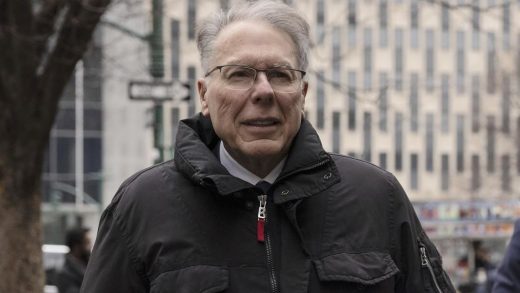:format(webp)/https://www.thestar.com/content/dam/thestar/entertainment/books/2023/02/08/former-calgary-flames-player-akim-aliu-on-his-new-graphic-memoir-dreamers-his-hope-to-change-culture-for-future-generations/dreamer.jpg)
Akim Aliu was surprised to learn his grandfather, who he considers his best friend, did not want to hold his brother, Edward, when he was a baby because he was Black.
“It was very difficult to put that in the book because of the present relationship … he did so much for us growing up,” Aliu said in an interview with the Star.
This is one of the many painful memories he shares in his new graphic memoir “Dreamer: Growing up Black in the World of Hockey,” written with Greg Anderson Alysée and illustrated by Karen De La Vega.
The former left-winger for the Calgary Flames, Aliu’s memoir tells the story of his family, his racialized experience in the NHL and how this experience curtailed what could have been a lasting career.
“Dreamer” captures the experience of dealing with generational racism and xenophobia. Aliu tells the Star he hopes sharing his own experience can help create a better future for the next generation and arm young readers with the understanding they are not alone.
“I built this book for kids from age eight to 15 or 16. I feel in those years you learn so much and it shapes you into the person you become,” Aliu said. When asked why he felt a graphic memoir was the best way to tell his story, Aliu said he believed our “tender years” are of utmost importance.
The memoir traces Aliu’s family’s early experiences, his father, Tai, who is Black, meeting Larissa Khrebet, Aliu’s white, Ukrainian mother and falling in love. Tai, from Nigeria, was attending university on a scholarship for track and field and academics. They faced resistance and racism from her family — only an aunt attended their wedding — and within the Russian (at the time) society.
Tai was detained by police and held in a Russian prison in 1995, having done nothing wrong except “refusing to give up his passport and neglecting to bribe those lovely, upstanding officers,” Aliu writes.
“Your refusal to cooperate with us as we do our job is what you have done wrong, Mr. Africa,” a police officer said to Tai.
The incident triggers Tai and Larissa to move, first to Nigeria, where Larissa faced sexism, relocating back to Russia, where they faced more racism — and eventually reconciliation with Larissa’s father. They then make it to Canada, where the family would settle and Aliu’s NHL story began.
Aliu has remained outspoken on several racist incidents faced throughout his hockey career. He recounts his initial excitement after being signed to the Windsor Spitfires, to the emotional letdown after being called the N-word by a former teammate. There was an inquiry after a hazing incident where Aliu and some other teammates were forced to go nude into a bathroom at the back of a team bus. Three weeks after that incident, a former teammate reportedly knocked out seven of Aliu’s teeth during practice. Aliu recounts other incidents, as well, some involving his former Calgary Flames coach Bill Peters.
While Aliu recalled these incidents, he also gives a nod to allies and heroes, including his late teammate and friend Mickey Renaud, who stood up for Aliu against their former coach.
In the memoir, Aliu recounts his mother, Larissa, saying he should have chosen the path of a professional soccer player — a sport she felt he would have fared far better in.
“I think about it all the time; I was way better at soccer than hockey, (and) I was a first-round pick to (the) OHL,” Aliu said between laughter to the Star.
But soccer in Canada 15 to 18 years ago was not as high-profile as it is today, he said, and opportunities to compete in Europe were fewer.
“I can’t guess how I would have done but I think of it all the time. Everything happens for a reason. I am where I am today to pave a way to the future,” Aliu said.
In 2020, Aliu and six other active and former NHL players launched the Hockey Diversity Alliance (HDA) — aimed at creating equitable programs to end systemic racism in hockey — and established his own organization titled the Time to Dream Foundation in the same year. In June 2022, Aliu and the HDA announced a program dedicated to making hockey accessible to children from diverse and under-represented communities — or paving the way as Aliu put it.
“First thing I always say is it’s very difficult to empathize with something you don’t understand or never went through. Empathy is walking hand in hand with someone and what they went through,” Aliu said to the Star.
“I’d love people to educate themselves a little bit more, stand up when you’re seeing things that are unjust. It isn’t just people of colour that will help us get over this hump, we need everybody,” Aliu concluded.
JOIN THE CONVERSATION

:format(webp)/https://www.thestar.com/content/dam/thestar/entertainment/books/2023/02/08/former-calgary-flames-player-akim-aliu-on-his-new-graphic-memoir-dreamers-his-hope-to-change-culture-for-future-generations/akim_aliu_author_photo.jpg)
:format(webp)/https://www.thestar.com/content/dam/thestar/entertainment/books/2023/02/08/former-calgary-flames-player-akim-aliu-on-his-new-graphic-memoir-dreamers-his-hope-to-change-culture-for-future-generations/aliu_first_goal.jpg)


